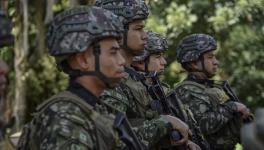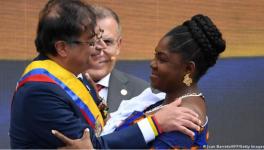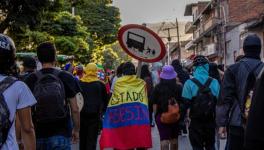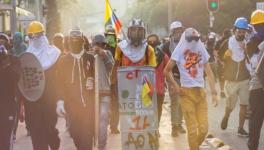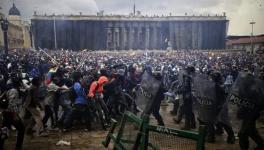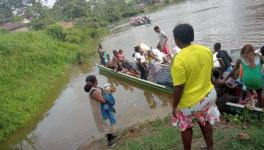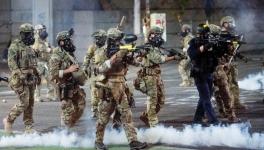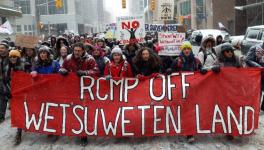Nine Reasons Why Colombians are Going on Strike
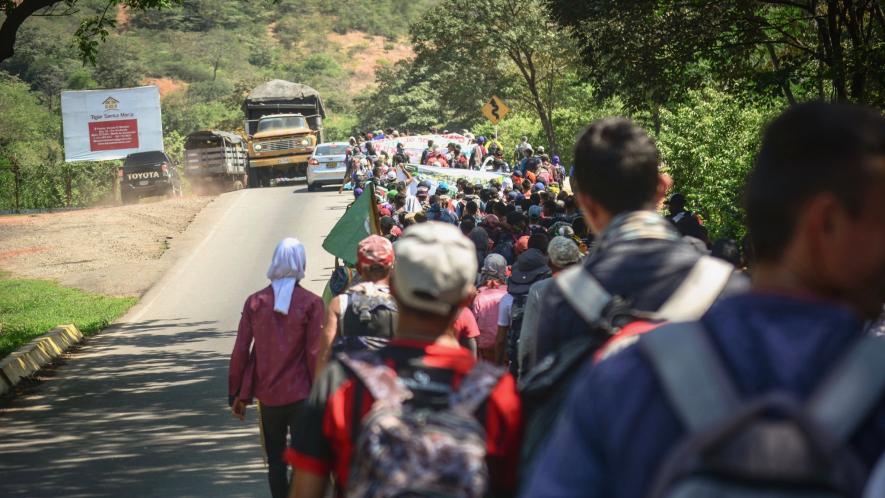
Tens of thousands will participate in the strike across Colombia on November 21. Photo: Colombia Informa
On November 21, Thursday. Colombia is set to go on strike – one of the largest in recent times. Trade unions, social movements, peasant, Afro-descendant, Indigenous, feminist, LGBTQI and community organizations, football fan barras, collectives of political prisoners and prisoners of conscience, and even beauty queens have pledged their support and participation in this national strike.
The strike is building off a number of protests against neoliberalism and imperialism across the continent and the world (Chile, Ecuador, Lebanon) and the constant mobilizations in the past year-and-a-half against the government of far-right president Iván Duque.
While each sector has specific demands, there are a number of common issues that have united Colombians against the repressive, neoliberal government of Iván Duque.
-
Genocide
The rejection of the ongoing genocide of social leaders, human rights defenders, ex-combatants, Indigenous people and Afro-descendant people has been one of the principle rallying cries of this mobilization. According to reports compiled by Colombian human rights organizations and social movements as well as international human rights organizations, the current estimate is that over 800 social leaders, human rights defenders, and ex-combatants of the Revolutionary Armed Forces of Colombia (FARC) and their relatives have been assassinated since 2016.
According to the National Indigenous Organization of Colombia, since Duque took office in August 2018, 134 members of the Indigenous movement including leaders, authorities and members of the Guardia have been assassinated.
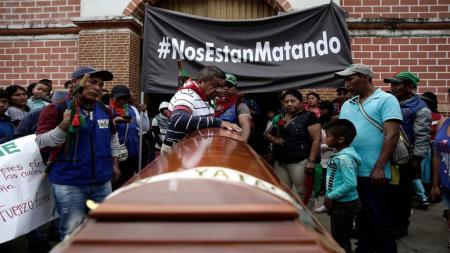
Indigenous Guardia attends the funeral of GersaÃn Yatacué who was assassinated on August 1 in Caloto, Cauca. The banner reads: âThey are killing usâ. Photo: Twitter
The perpetrators of these crimes range from members of the Armed Forces of Colombia and the National Police, to members of paramilitary groups and criminal groups. Many of the victims received threats and intimidation prior to their assassinations and had reported this to state institutions and authorities yet did not receive proper protection.
Affected organizations have noted that the strategy of the right-wing in assassinating leaders has shifted. Today, it is rare that a very visible, well known, national leader will be assassinated, as they know that the reaction will be very strong. Instead, local, community leaders who are engaged in territorial resistance and pose direct obstacles to the advance of territorial expansion and control are being targeted, whose assassinations can be forgotten and explained away as a ‘dispute between neighbors.’
Social movements, Indigenous movements, Afro-descendant organizations and human rights organizations have deemed the systematic assassination of those who fight for change and peace in Colombia as a genocide and have demanded that the government of Iván Duque adopt real measures to both protect the lives of leaders in Colombia and to dismantle the paramilitary structures which perpetrate these crimes to impose their political and economic project in the regions.
-
Peace
One of the central fears in the 2018 presidential elections was that Iván Duque, protégé of warmongering ex-president Alvaro Uribe Velez, would mean a setback towards efforts at peace in Colombia and an intensification of the war. This in effect has proved to be true. Though a peace agreement was signed between FARC and the National Government led by Juan Manuel Santos in 2016 in Havana, Cuba, Duque’s government has systematically sought to undermine it.
For example, in March 2019, Duque raised objections to six of the founding articles of the Special Jurisdiction for Peace, the transitional justice system created through the peace agreements, in an effort to debilitate the important mechanism.
The funding cuts to projects created through the peace accords has meant that the productive projects created to help with the economic and social transition of ex-combatants have not been able to be fully implemented, leaving many ex-combatants in limbo with no economic opportunities. The result is that many have returned to armed groups, ranging from FARC dissident factions to criminal groups.
The peace process with the National Liberation Army (ELN) has also faced serious challenges. Since Duque took office, his government refused to send a delegation to Havana to continue the cycle of talks initiated with the government of Juan Manuel Santos. Finally, following an attack on a police training school in Bogotá, Duque announced that the government was suspending the talks and issued arrest warrants for the members of the peace delegation team, in violation of established protocols. Since then, the attacks on the ELN and the regions they control have intensified.
-
Duque’s Neoliberal ‘Paquetazo’
Taking inspiration from the movements of Ecuador, Colombian’s trade union confederations and social organizations have gone on the offensive against the labor, pension and tax reform that Colombia’s right wing seeks to implement which they claim would worsen conditions for workers, privatize pensions, and give (further) tax advantages to multinational companies, among other things. While the bills for these reforms have not yet been presented in totality before the legislature, through declarations of government ministers and legislators from Duque’s Democratic Center party, it is clear what kind of reform the government wishes to pass.
They have denounced the labor reform, for example, is likely to include a contract scheme based on hours, differential salaries by regions, a different minimum wage for youth and the intensification of the scheme wherein companies have less responsibility to cover worker’s benefits.
Organizations have identified international economic institutions such as the OCDE, the International Monetary Fund (IMF), and the World Bank, as key in pushing these reforms.
-
Police brutality
The increase in social protest since Duque took office has been accompanied by an extremely militarized and violent response. The Mobile Anti-Disturbance Squad (ESMAD) has been the protagonist of this violence and in the past year has been responsible for several deaths, protesters losing eyes, and other grave injuries due to their arbitrary firing of tear gas canisters, stun grenades, non-conventional weapons and batons.
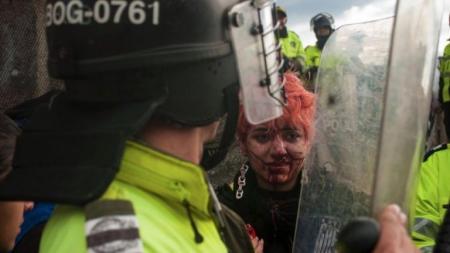
Student protests in Colombia have been heavily repressed by the National Police and ESMAD. Photo: Colombia Informa
Student organizations who have received the brunt of this violent repression during their massive mobilizations for public education have called for the dismantling of the body as its principal function is to violently repress the people.
During the Minga Social in March and April which saw tens of thousands of peasants, Indigenous people and Afro-descendant people in the Southwest region of Colombia mobilize on the Panamerican Highway, ESMAD units burned protest camps and violently attacked protests.
-
Massacre of 18 children
On November 5, Senator Roy Barreras of the Social Party of National Unity presented information about a bombing carried out by the Colombian military against an alleged FARC dissident camp in San Vicente de Caguán in the department of Caquetá on August 29. Following the bombing, government officials announced that it was a successful operation and “14 criminals have been killed” but, as it was denounced by Barreras, Government officials hid the fact that eight minors had been killed in the bombing, which was clearly stated in the forensic report after the bombing.
The following week, the media organization Noticias Uno revealed that according to testimonies of the local community, the number of children killed in the bombing could be as high as 18. They reported that there were supposedly three who survived the bombing but were chased by dogs and shot down by the army while they were running for safety.
While the cover-up scandal resulted in the forced resignation of Defense Minister Guillermo Botero, it is clear that president Iván Duque was also implicated in both the cover-up of the information about the children and in ordering and incentivizing the bombing.
-
Militarization of the territories
Despite the Government’s rhetoric of peace internationally and a signed peace agreement, the reality is that Colombia still acts as if is a war zone with an extremely dangerous internal enemy. As it has historically done, the response of the Colombian state to social protest, demands for structural change of the social, political and economic model, and violence by non-state actors is militarization. This is manifested not only in the constant visible presence of soldiers, army bases, and tanks in cities, on highways, in the mountains, in small villages and in the countryside, but also in terms of spending. Colombia has the second largest army in Latin America and is one of the top three spenders on defense in the region along with Brazil and Mexico.
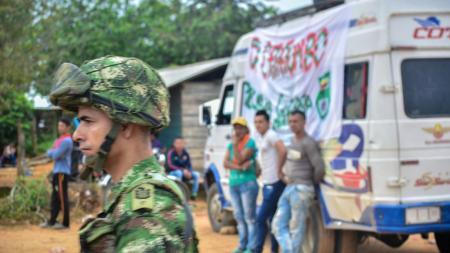
Photo: Colombia Informa
Social organizations denounce that not only does the continued militarization of the territories threaten the lives of communities, but if less money were spent on defense and fighting their own citizens, perhaps the state would be able to afford things that Colombian people desperately need like health and education.
-
Criminalization of social movements
The criminalization of social movements is another tactic employed by the Colombian state to combat the strength of social and people’s organizations in the country and engender a climate of fear and suspicion. Dozens of leaders of people’s movements in Colombia have been arrested, imprisoned and charged with terrorism, rebellion, and other serious allegations when their only crime is being a social leader and fighting for peace, justice and dignity.
The cases of Julián Gil, Alix Miriam Aguilar and José Hermes Burgos of the People’s Congress and Sara Quiñonez and Tulia Maris Valencia of Black Communities Process, which have almost no material evidence to support the charges against the leaders, have highlighted the desperate attempt of the state to break the resistance of the people.
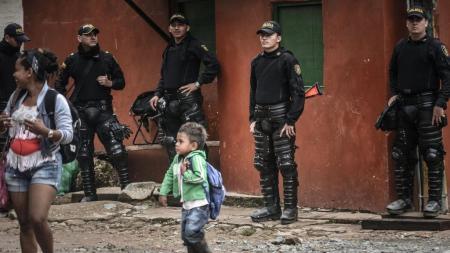
Members of the Mobile Anti-Disturbance Squad (ESMAD) posted in a village. Photo: Colombia Informa
In the last few days, Colombian movements have also announced that the Public Force has been targeting organizations and leaders that have been active in denouncing Duque’s regime and in participating in the organizational efforts for tomorrow’s strike. The People’s Congress denounced on Tuesday November 19 that at dawn, the National Police carried out 27 raids almost simultaneously of the houses of leaders from the People’s Congress, members of artist collectives, student groups and of the office of the alternative media project Cartel Urbano.
The raids were conducted in order to investigate crimes such as “terrorism and fabrication, traffic or carrying of arms or ammunition of private use of the armed forces, or explosives”. Police confiscated objects such as flags, keffiyehs, hats, glass jars, gloves, paint, posters and tape, all objects used in social protest.
The People’s Congress denounced the raids and stated “it is evident that the irregular and openly anti-democratic actions carried out…seeks to pressure, generate fear, criminalize, and at the very least dissuade the broad participation of social processes and their members in the National Strike on November 21, and they do this abusing their political, economic and military power which is directly controlled by the regime of Iván Duque and his party Democratic Center.”
-
For a dignified life
Despite the heavy militarization, violent repression, and criminalization, Colombians continue to risk everything to fight for the right to a dignified life; access to healthcare, education, healthy food, dignified housing, land and peace. Colombia is one of the most unequal countries in the region only preceded by Haiti, Honduras, and many in the country do not have access to those basic rights.
Students in Colombia have been extremely active in mobilizing for access to free and quality public education while the government is determined to cut budgets for public institutions and encourage privatization.
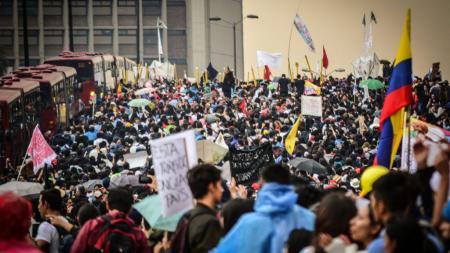
Colombian students mobilize in defense of public education. Photo: Colombia Informa
-
Latin America rising
The rebellions against the neoliberal measures in Ecuador and Chile, as well as the brave resistance of the Bolivian people against the racist, right-wing coup d’état, have given Colombian movements not only the momentum to continue the continental uprising, but also the confidence and will to confront the violent repressive state.
The energy across the continent is one of solidarity, rebellion and strength, in the wake of the uprisings, people’s movements across the continent have responded with active solidarity, holding massive rallies and mobilizations in support of their brothers and sisters on the streets, writing articles and declarations to share the reality of whats happening. It is a historical moment of change and defiance to the elites on the continent and imperialist forces.
Get the latest reports & analysis with people's perspective on Protests, movements & deep analytical videos, discussions of the current affairs in your Telegram app. Subscribe to NewsClick's Telegram channel & get Real-Time updates on stories, as they get published on our website.









